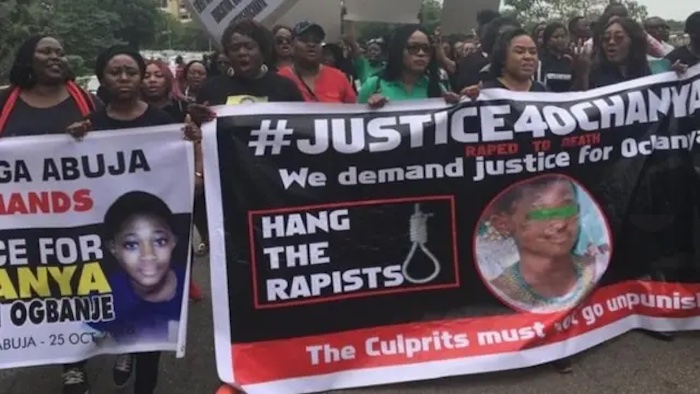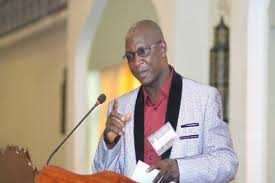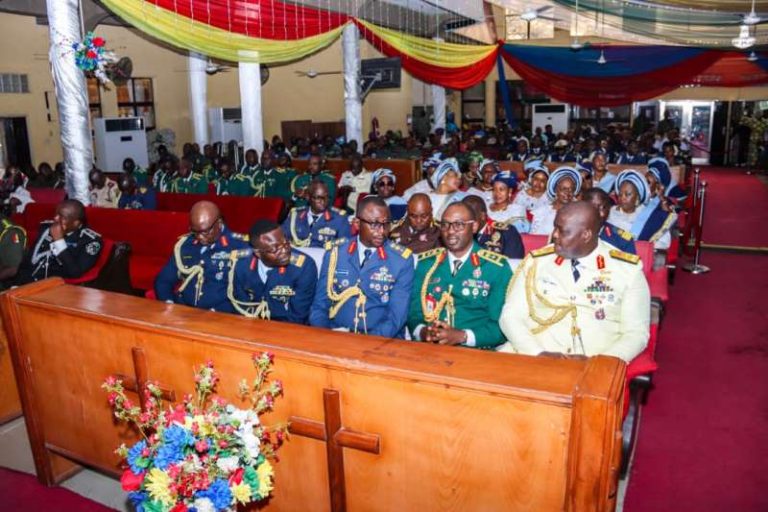
Fresh outrage has erupted across Nigeria as citizens demand justice for 13-year-old Ochanya Ogbanje, years after the acquittal of Andrew Ogbuja, a lecturer at the Benue State Polytechnic, who was accused — alongside his son, Victor — of raping his niece to death.
The renewed calls for accountability follow a report by African digital outlet ZikokoMag, which reignited public anger over what many see as a failure of Nigeria’s justice system to protect minors and ensure justice in cases of sexual violence.
Ogbuja was cleared by a Benue State High Court, which ruled that the prosecution failed to prove its case beyond reasonable doubt. His son, Victor, remains at large.
On April 21, 2022, two courts in Benue delivered conflicting judgments that exposed deep cracks in Nigeria’s legal process. While the Federal High Court found Felicia Ogbuja — Andrew’s wife and Ochanya’s aunt — guilty of negligence and sentenced her to five months in prison, the State High Court, presided over by Justice Augustine Ityonyiman, acquitted Andrew of all charges.
Justice Ityonyiman based his verdict on what he described as “the failure of the police to medically match Andrew to the reports presented before the court” and on “contradictory autopsy reports” submitted as evidence. The ruling has been widely condemned as another miscarriage of justice.
Under the Trafficking in Persons (Prohibition) Enforcement and Administration Act, 2015, the offences for which Felicia Ogbuja was convicted are clearly defined and punishable by law.
Section 13(4)(b) of the Act provides that “any person who omits to do anything that is reasonably necessary to prevent an act of trafficking in persons commits an offence.”
Section 15(1) prescribes that anyone who aids, abets, or facilitates such an offence is liable on conviction to imprisonment for up to two years, or to a fine not exceeding ₦250,000, or both.
In addition, Section 38 of the Act states that “any person who, without lawful excuse, obstructs or interferes with an authorised officer of the Agency in the performance of his functions under this Act commits an offence and is liable on conviction to imprisonment for a term not exceeding five years or to a fine not exceeding ₦500,000, or to both.”
According to a BBC report, Andrew Ogbuja was arrested in 2018 and arraigned on October 10, 2019, at the Benue State High Court on a four-count charge bordering on rape and culpable homicide. He pleaded not guilty to all counts. In April 2022, Justice Ityonyiman discharged and acquitted him, ruling that the prosecution had failed to prove the allegations beyond a reasonable doubt.
The court noted that investigators from the Nigeria Police Force failed to conduct a medical examination to match Andrew’s DNA with evidence in the medical reports. It also pointed to inconsistencies between two autopsy reports: one from the Federal Medical Centre, Makurdi, which cited natural causes, and another from the Nigeria Police Forensic Laboratory in Lagos, which linked Ochanya’s death to complications from sexual abuse.
Meanwhile, recordings presented during the investigation captured Ochanya narrating the circumstances of her abuse. At the time of her death, she was a Junior Secondary School 1 student at the Federal Government Girls’ College, Gboko, Benue State.
Born on March 10, 2005, in Ogene-Amejo, Benue State, Ochanya was the youngest of eleven children. When the only school in her village closed, her parents, Michael and Rose Ogbanje, sent her at age five to live with her aunt, Felicia, in Ugboloko, to continue her education.
She moved in with Felicia, her husband Andrew, and their five children — hoping for a better future. Instead, she suffered years of sexual abuse, beginning at just eight years old.
Their daughter, Winifred, first discovered the assault and reported it to her parents. “Though Andrew initially scolded his son, he later joined in the abuse himself,” she said. “Neither he nor Felicia informed Ochanya’s parents — not even as the child’s health began to fail.”
By 2012, Ochanya’s health had begun to deteriorate. She was constantly in and out of hospital, and by 2018, while at the Federal Government Girls’ College, she could barely stand, suffered uncontrollable leakage of urine and faeces, and spent her last months in diapers.
On October 17, 2018, Ochanya died at the age of 13 after battling Vesicovaginal Fistula (VVF), a condition doctors confirmed was caused by prolonged sexual assault.
Her death sparked nationwide outrage and a renewed push for justice reform and stronger laws to protect minors.
Investigative journalist Kiki Mordi, among those condemning the acquittal, said the judgment reflects a wider failure of Nigeria’s justice system.
“I still have that nasty feeling in my throat I had when I read about little Ochanya seven years ago. She would have been 20 today. She was eight when her cousin started raping her, and after he was exposed, his father joined in. She died from VVF complications at 13,” she said.
Mordi added, “Nigeria allowed a man accused of raping a 13-year-old girl to death to walk free — and even return to teaching. His acquittal is not an anomaly. According to the National Bureau of Statistics, fewer than one in ten rape cases in Nigeria ever result in conviction.”
Over the weekend, renewed outrage spread across social media under the hashtag #JusticeForOchanya, following a Change.org petition calling for the case to be reopened. Human rights groups and gender advocates are again urging the federal and Benue State governments to ensure justice is finally served.
“Justice delayed must not remain justice denied,” one rights activist said, as calls grow for Nigeria to strengthen its legal and investigative framework to protect children like Ochanya from systemic failure.
Boluwatife Enome



